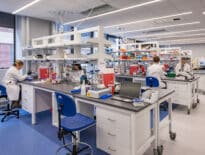Paul Ognibene
Founder and CEO, Urban Spaces
Age: 51
Industry experience: 19 years
Urban Spaces is making a mark on wide-ranging elements of the local real estate industry, from creation of affordable housing on vacant lots in Boston neighborhoods to major mixed-use projects on the outskirts of Cambridge’s Kendall Square. In 2004, Paul Ognibene founded the Cambridge-based development firm, which is seeking approval for a 90-unit apartment complex replacing two small commercial buildings at 75 First St. in that city. The proposal is the latest phase of Urban Spaces’ $275 million First Street Corridor mixed-use development, which already includes apartments, retail space and an office building originally leased by CarGurus. Ognibene has teamed up with Parent + Diamond Real Estate Development to construct affordable housing in Dorchester, Mattapan and Roxbury through Boston’s scattered sites initiative.
Q: Are project costs easing for multifamily development in 2023?
A: That’s the one area where we’ve had some encouraging news. Construction costs over the past several years have escalated so much, but we are seeing some relief. With the rapid increase in interest rates, it really has slowed down housing developments because the projects just don’t pencil. Capital isn’t as available as it used to be. Luckily, we’re capitalized and we’re in a position where I hope we can take advantage of some slower construction costs, and in two years when we’re ready to sell, the market will have come back down to a better landing place. Some of the general contractors we’ve spoken to, and definitely some of the subcontractors, are looking to fill their book of business, and I think it will help them be a little bit more aggressive on pricing, which will be great.
Q: What’s Urban Spaces’ latest pipeline for Cambridge development projects?
A: We partnered with POAH [Preservation Of Affordable Housing] and we are doing a tax credit deal at 49 Sixth St. in Cambridge. It’s a former Archdiocese [of Boston] property: an old school, convent and rectory. We started Urban Spaces over 18 years ago by acquiring an Archdiocese property, so we’ve kind of come full circle. We’ve completed the permitting [for 43 apartments] and now we’re in design. We expect to start construction in the spring and the project cost is $25 million to $30 million. It’s 100 percent affordable, so we utilized the Cambridge affordable housing overlay zoning, which is relatively new. The permitting was expedited a little bit because of that. The overlay provides that for an all-affordable project, you do not need to bring parking along. And that obviously has multiple implications. It keeps the cost down, and makes things affordable. There’s neighborhood and marketing considerations where you might want parking, but it becomes a market decision instead of a mandate.
Q: What are the opportunities you’ve found through Boston’s scattered sites initiatives and other surplus property programs?
A: Currently we have 21 residences in four buildings under construction through the scattered sites program, responding to two different RFPs. They are all income-restricted home ownership units, and credit is getting tighter, but there’s still capital readily available. This project doesn’t have tax credit equity, but it has a subsidy from the Mayor’s Office of Housing and our lender is First Republic Bank. The first units are going to be rolling out this summer at 17-19 Helen St., with income restrictions at 80 to 100 percent of area median income. The sales price is $450,000 on average.
We look at this more as our community participation project. The [developer’s] fee is relatively modest, and it’s more just to do something productive in the community. We’ve done a couple of projects in the past, including one at 1501 Commonwealth Ave., a former nursing home that the city took over and put out for an RFP. We acquired it and ultimately developed it in the last cycle, when condominium development was a little bit out of vogue. We did home ownership units, and by the time we came out it was good because people were looking for condos and there wasn’t a lot of supply. The next one we did with an RFP was for the city of Salem. We just completed the Brix, which was 51 condos.
Q: How do you expect office space demand will trend in the near future?
A: I’m still bullish on office space, and while the work from home movement is significant, there’s still very much a need to come to the office. The way office space was going, the square-footage per employee was going down to the point where it was very tight. While there might be a reduction in the need for space because some segment of the workforce will work from home permanently, the counterbalance is the elbow room is going to increase. We’ll see if those two influences cancel each other out. I think they will. The delis and retailers in the area depend on the office traffic, and that relationship needs to be looked at.
Ognibene’s Five Favorite Foods:
- Giordano’s Chicago pizza
- Hot dog at Fenway
- Chicken fajitas
- Philly cheese steak
- Caesar salad




 |
| 


